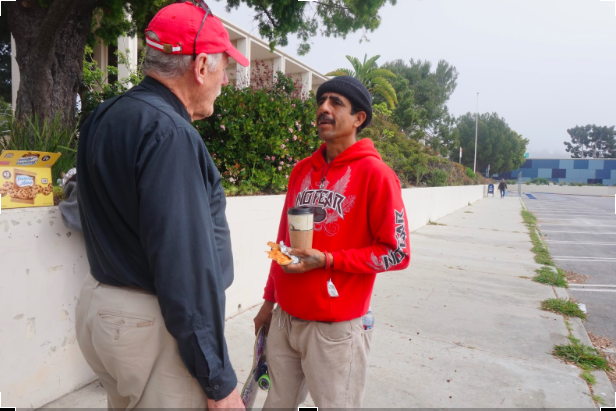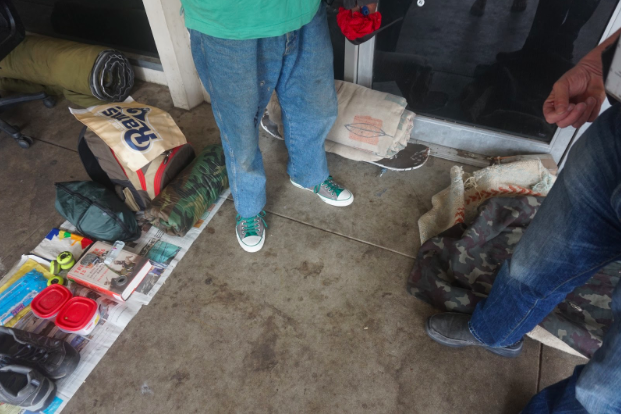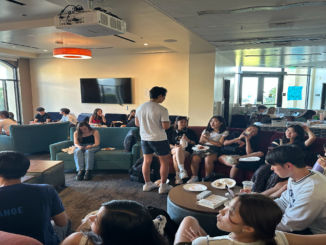
People understanding people.
That is the resounding sentiment in Malibu as the city council begins to team up with community members in an effort to connect with and assist the growing homeless population in Malibu.
“It’s mostly about relationships,” said Alexander Gittinger, head of the Malibu division of the Ocean Park Community Center, located in Santa Monica.
The city of Malibu is partnering with the community to form relationships with and assist the growing homeless population. While Malibu would like to get everyone into housing, some prefer to stay living outdoors.
Leading the way is the Malibu Task Force on Homelessness, a group of residents that for the past three years have donated their time and money to form solutions on how to best assist those that are homeless in Malibu. Task Force Member Jay Scott said their primary goal is to reach out and form relationships with the homeless.
They work on fundraising and organizing awareness, as well as coordinating with the Ocean Park Community Center.
Malibu City Councilmember Laura Rosenthal said she is amazed by the sudden outpouring of support from Malibu residents. Rosenthal said she never expected the rise in volunteers and willingness to work directly with the homeless. The Malibu City Council recently held a town hall to bring awareness to the needs of homeless population and inform the community on the Task Force’s recent efforts.
Some 161 homeless members reside in the Malibu community, Scott said. The Task Force has worked with the Ocean Park Community Center to reach out and communicate with 106 of them as of mid-April. Eight people have successfully gained stable housing thus far in areas outside of Malibu, where housing is cheaper.
Counts on the number of homeless have always fluctuated in Malibu. There were roughly 65 people in 1995 and dropped down to 10 in 2005, according to The Malibu Times, before rising to today’s 161.
Scott said a common reason homeless are coming to Malibu is the mild weather that enables them to live outdoors and the desire to live in a relatively safe place by the beach.
The Task Force has raised money to pay two members of the Ocean Park Community Center to focus specifically on Malibu. These employees work as a team and go out into the homeless community to make contact with different people. They aim to form a relationship, while at the same time getting people “back on their feet.”
Gittinger, a former substance abuse counselor, knows his way around the homeless community of Malibu. He said drugs have recently become an issue and deeply affected some of the homeless that he has been working with.
“You never know what situation you’ll walk into,” Gittinger said. “Sometimes beer cans are flying and sometimes people admit that they need help.”

Helping the homeless
How the homeless are receiving this strong push for help depends entirely on the situation and the person.
Pepperdine University Sociology Professor Robin Perrin said certain factors such as mental illness and paranoia will play into an individual’s likelihood of accepting help. However, Perrin said that shouldn’t stop people from trying.
“Homelessness is a human-created problem and we can fix it,” Perrin said.
Perrin explained how many homeless got there because of a downward spiral. A lost job can lead to lost housing. A couple months turns into years, and before the person knows it, homelessness is their new normal. After that, help can be hard to receive.
But groups like the Task Force and community center still try.
Homeless or home-blessed?
The Rev. Paul Elder of St. Aidan’s Episcopal Church is a calm, gentle presence. For the past two months he has been coming to the Malibu Public Library five days a week to serve lunch to the homeless population.
“Every one of these people have their own story and when you look at some of their lives you can’t blame them,” Elder said.
Elder said a lot of the homeless he meets are missing the stabilizing support of family and friends, and some are dealing with side effects of medication usually taken for mental disorders. Side effects include mood swings and instability. While medication helps, Elder said it can sometimes make the situation more problematic.
Coming out every day provides Elder with the opportunity to reach out to people and talk over food, one of the basic necessities.
Jorge Mario Uribe is a member of the homeless community and frequents Elder’s weekday lunch, as well as different church services in Malibu.
Uribe has an optimistic perspective on his situation.
“I’m home-blessed,” Uribe said. “I can work. I can walk. I don’t have any big needs.”
Uribe said he is currently working with the Malibu Labor Exchange in an effort to send money to his family, which includes his own young children, as well as nieces and nephews.
With tears in his eyes, he talked about his children, who do not live with him. He said he may not have a constant roof over his head or the promise of a hot shower, but God has still blessed him. Uribe said how fortunate he is to be able into any walk Malibu church and be respected and safe.
“I have everything I need,” Uribe said.
Why some choose a life outdoors
Justin Schneider, assistant director of the Pepperdine Volunteer Center, said every person in Malibu should be acknowledged and valued as members of the community.
The PVC has two job positions addressing homelessness. Hunger and Homelessness Coordinator Jessica Jiang said they bring people, donations and food everywhere from Ventura to Skid Row in downtown Los Angeles. Skid Row has the greatest density of homeless in the United States.
Schneider said every person is different and should be looked at on a case-by-case basis. While there are newly homeless (less than one year) and chronically homeless (over one year), they both need ongoing support in order to change their situation.
However, Schneider said not everyone wants to necessarily be housed. Malibu is beautiful, and some are simply content with living outside.
“There are people that don’t want to be housed,” Schneider said. “The reality is, if they’re not harming anybody how do we support them?”
Arnold, who prefers not to give his last name, is an example of that.
He came to Malibu in 2010 and doesn’t necessarily consider himself homeless because he made the choice to live outside.
“I walked away from everything because because it was the best thing to do,” Arnold said.
He said where he is now in life is much better than where he could have been. He attributes it all to his current lifestyle.
“There’s no better place than the beach and the mountains,” Arnold said.
Arnold recognized Gittinger outside the library right away and highly praised the work that he and the Task Force have done for his friends. He said that after meeting different people he has come to realize that people deal with life in a variety of ways, and being on the streets is one of them.
“A lot of my friends are being affected in a good way by Alex (Gittinger),” Arnold said.
Ashley Chavez completed this story in Jour 241 in spring 2017. Dr. Christina Littlefield supervised the web version and Dr. Theresa de los Santos supervised the video package.



